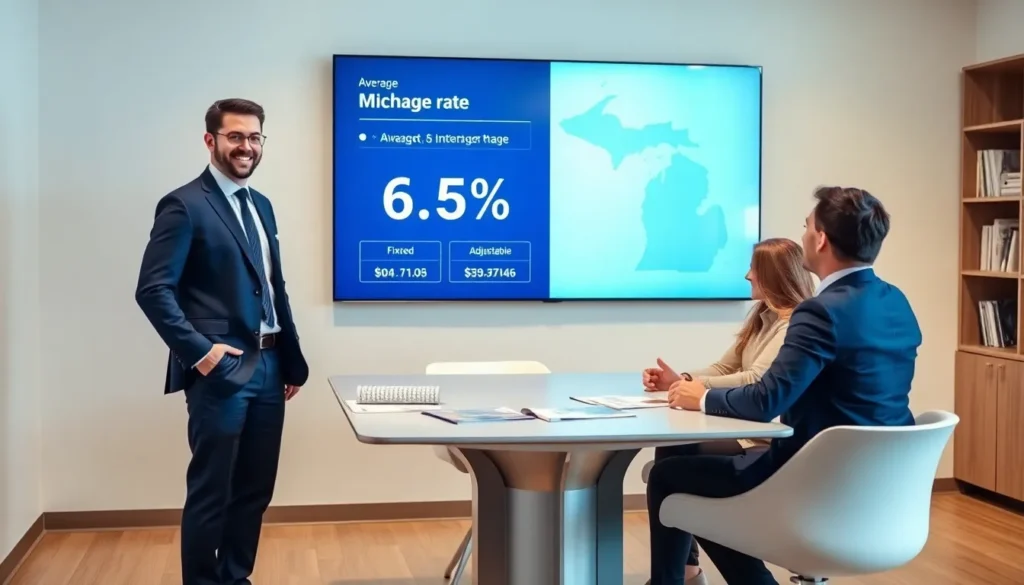Imagine a world where the only thing standing between you and your dream home is a series of numbers, specifically, mortgage rates. In Michigan, these numbers can make or break your financial future. So, whether you’re already house-hunting or just in the daydreaming phase, understanding the average mortgage rates in Michigan can help you navigate this exciting journey. Let’s immerse and decode the complex world of mortgage lending, after all, who said finances have to be boring?
This guide will equip you with a wealth of knowledge, sprinkled with a touch of humor as we demystify these rates and empower you with strategies to secure the best deals.
Understanding Mortgage Rates

Mortgage rates can feel like a twisty maze of confusion, but they boil down to a simple concept: the interest cost associated with borrowing money to buy your home. Put plainly, a mortgage rate is the fee, typically expressed as a percentage, that a lender charges you for the privilege of borrowing their money.
Understanding the distinction between fixed and adjustable rates is crucial here. Fixed-rate mortgages lock in your interest rate for the duration of the loan, providing stability. Meanwhile, adjustable-rate mortgages (ARMs) can fluctuate based on market conditions, which can either lead to savings or, if you’re not careful, unexpected financial headaches.
Factors Influencing Mortgage Rates
Various factors play into the ever-changing landscape of mortgage rates. One of the main considerations is the state of the economy. When inflation rises, lenders often raise their rates to adjust. Investors’ confidence also plays a role: if they’re optimistic, they may demand less return on investment, leading to lower mortgage rates.
Another essential aspect is your personal credit score. A higher credit score typically means lower rates because lenders see you as a lower risk. Conversely, if your credit leaves something to be desired, expect to pay a premium. Also, larger down payments can significantly impact your rate, allowing you to secure a better deal. Last but not least, the type of loan, be it conventional, FHA, VA, or USDA, will also influence your mortgage rate.
Current Average Mortgage Rates in Michigan
As of this month, the average mortgage rate in Michigan hovers around 6.5%. Of course, this number is fluid and can shift based on multiple factors. Let’s break down how these averages play out across various loan types.
Comparing Mortgage Rates Across Different Loan Types
Different loan types gather different averages, so it’s essential to know what you’re looking for.
Fixed-Rate Mortgages
The traditional fixed-rate mortgage in Michigan currently reflects an average rate of approximately 6.7%. This option is ideal for those who value consistency in their payments over time.
Adjustable-Rate Mortgages
On the other hand, ARMs average around 5.9% at the moment. While this might look appealing initially, buyers should be wary about future rate hikes.
Government-Backed Loans
For those who qualify, government-backed loans like FHA and VA loans can come with lower rates, which currently sit around 6.1%. These loans often have lower down payment requirements, making them an attractive option for first-time homebuyers.
Historical Trends in Mortgage Rates
Looking back at historical mortgage rates can provide valuable insight into trends that might influence future rates. Over the past decade, Michigan saw mortgage rates fluctuate significantly, from the lows of 3% during the pandemic to recent highs exceeding 6%.
Tracking these trends is crucial for potential homebuyers. When rates are high, waiting for them to drop might seem tempting: but, it’s vital to balance that with the risk of prices rising or the perfect home slipping away.
Tips for Securing the Best Mortgage Rate
Finding the best mortgage rate doesn’t need to be an exercise in frustration. Start by improving your credit score. It’s amazing how a small bump in your score can significantly affect your rate. Next, shop around: don’t just settle for the first offer. Different lenders can provide dramatically different terms.
Consider locking in your rate if you find one you like. Rates can change daily, and once you lock them in, you can breathe a little easier, knowing what your payments will look like for the foreseeable future. Finally, be prepared to negotiate. Lenders value strong buyers and might be willing to offer better terms than initially presented.






